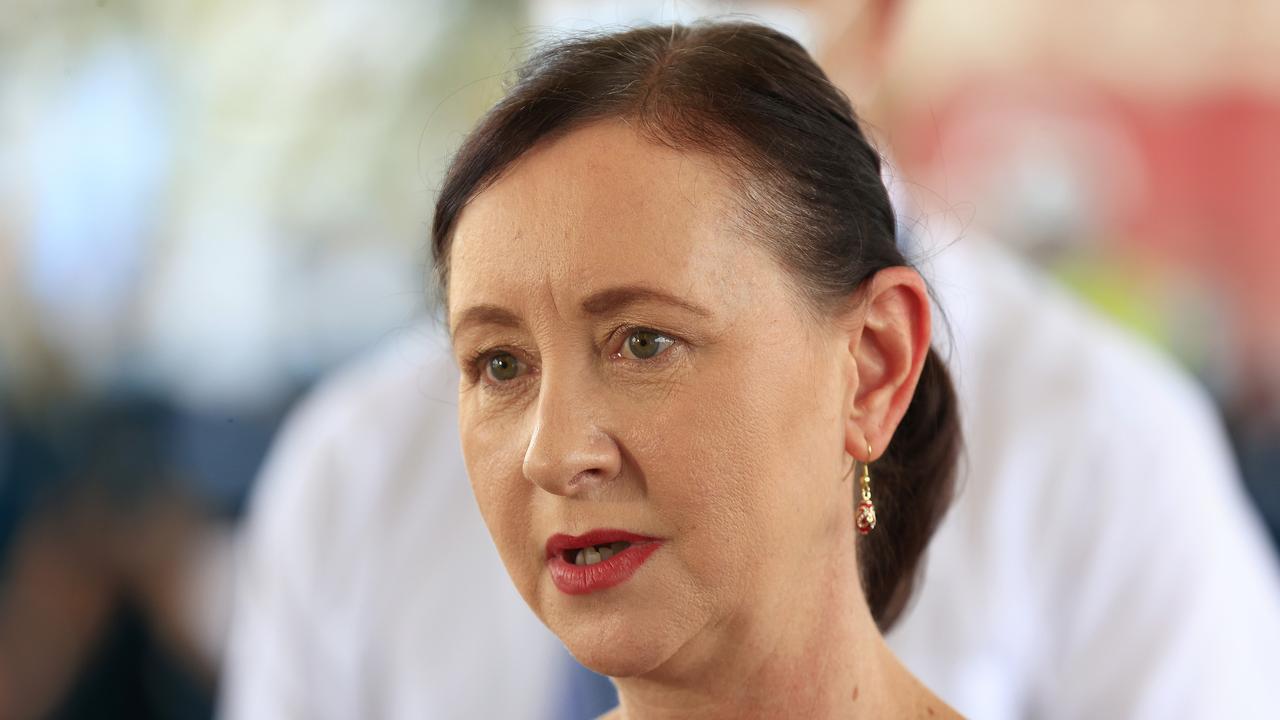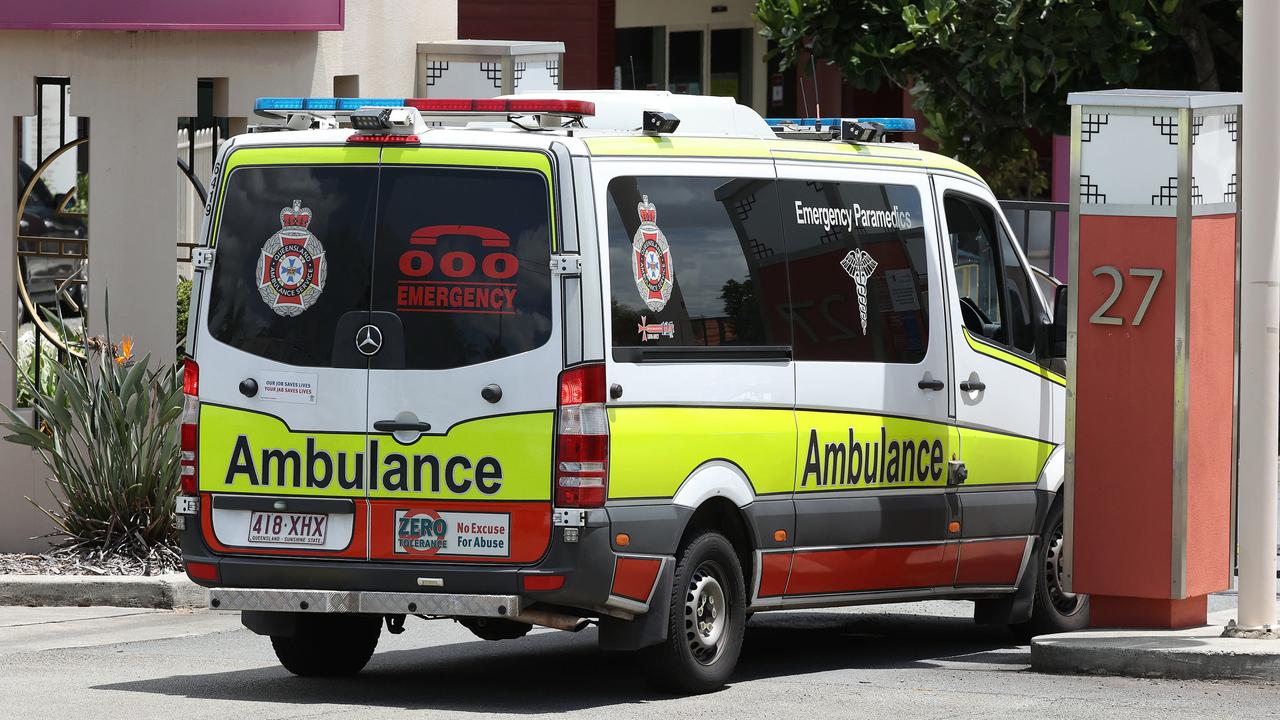Qld Covid-19 update: 14 deaths, 5977 new cases as schoolkid infection numbers revealed
Queensland has recorded almost 6000 new Covid-19 cases, with Health Minister Yvette D’Ath announcing 14 more deaths in the state. There are now more than 1100 school-aged children with the virus.
QLD Coronavirus News
Don't miss out on the headlines from QLD Coronavirus News. Followed categories will be added to My News.
Fourteen more people have died with Covid-19 in Queensland in the past 24 hours, with a total of 5977 new cases reported.
Health Minister Yvette D’Ath said the deaths were in people aged from their 60s to their 90s.
Chief health officer Dr John Gerrard said one person who died was in their 60s five in their 70s, five in their 80s and three in their 90s.
Ten of the deceased were in aged care. Three of the 14 were unvaccinated, two had one dose, five were double dosed and four had boosters.
There are now 535 people being treated in hospital, down from 579 on Thursday.

There were 280 children in the 5 to 11 year old age group who tested positive to COVID via a PCR on Thursday, which is a slight increase from the day before.
Dr Gerrard said overall there were 1149 school aged children who tested positive in the past 24 hours, warning that the virus is widespread.
“It’s not a surprise and we’re not unduly concerned about it,” he said.
“We just need to see what happens with the trend with children.”
Dr Gerrard said children who have any symptoms should stay away from school, be tested and household members who are positive should quarantine.
“The main lesson from that is that this virus is very widespread. That has been the case for a number of weeks.
“We know the numbers will decline.”
He said the state government has offered assistance to aged care facilities.
“If the Commonwealth requires any resources we have in Queensland Health we will certainly look at that,” he said.
Ms D’Ath said the situation at Jeta Gardens, the Logan aged care facility hit hardest by Queesland’s Omicron wave - was not unique.
“We are seeing outbreaks right across the state, we are seeing a shortage of staff right across the state in aged care.”
Ms D’Ath said there was probably about a dozen aged care facilities that are on a watchlist right now because of the outbreak and staffing levels.
“I think all this will be reviewed at some point in the future - whether that should be done by individual states or at a national level - that is an option.”
Ms D’Ath said it made sense for the review to be done by the commonwealth, the government which “regulates and funds” aged care.

“They took responsibility for the rollout of vaccines and managing the outbreaks in aged care - there should be a national review at some point as to the handling of that.”
Ms D’Ath said the state government supported calls for upgrades to nurse to resident ratios in aged care.
“There is a ratio being brought in by the commonwealth - it is less than what the Royal Commission recommended. It has a lag, a long lead in time - I do think it’s important. We support the calls and support the Royal Commission’s recommendation into nurse patient ratios,” she said.
Ms D’Ath said Queensland has brought in nurse-patient ratios into “our health system and into the aged care system.
Queensland on Thursday recorded 5854 new infections and eight deaths, as authorities revealed the “worst case scenarios” the state had been bracing for during the Omicron wave.
Premier Annastacia Palaszczuk said most of the state had passed the worst of cases, but Townsville, Wide Bay, Northwest and Torres Cape, Darling Downs and Central Queensland areas were yet to reach theirs peak.
The State Government had been preparing for more than 4000 Covid-19 hospitalisations in early February, with nearly 400 in intensive care.
But the peak arrived much sooner than expected, and Omicron was far less destructive than modelling had showed.
Ms D’Ath said a trial extending the scope of practice for pharmacists “particularly in our regions where we know that there are not as many GPs available” had been an election commitment.
“This is a trial, it’s about seeing what we can do and the pharmacists would have to undertake additional training to provide any of these services.”
“This is not unique - Canada, New Zealand and the Uk do this already that they are providing broader services and it’s also something that if we want to make sure our health system is more sustainable and that we are utilising the full scope of training and capabilities of everyone who makes up the health system including our nurses.
“We are talking about full scope of practice with our nurses in our hospital system as well.”
Ms D’Ath said this is a “sensible approach” and that training would likely be up to 12 months.
She said she respected the views of AMAQ president Professor Chris Perry, “however, we have already been running a trial and I believe this has been very successfully applied.
“Obviously first and foremost is making sure we are delivering safe healthcare to the public - that has to be the guiding principles in whatever we do but I respect the AMA’s view.”
“We have a very decentralised state in Queensland and we should be making sure that we are delivering modern and effective health care all over the state.”



